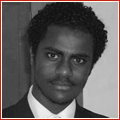A true glimmer of hope or a mere mirage? Term and age limits in the ‘new’ Ethiopia
Posted: 15 October, 2012 Filed under: Adem Kassie Abebe | Tags: constitution, constitutional amendments, Ethiopia, governance, leadership, rule of law, Terms and age limits 1 Comment Author: Adem Kassie Abebe
Author: Adem Kassie Abebe
Doctoral candidate, Centre for Human Rights, Faculty of Law, University of Pretoria
After spending more than 21 years at the helm of Ethiopian politics, Meles Zenawi died of an unannounced sickness in August 2012. The absolute dominance of the ruling party, the Ethiopian People’s Revolutionary Democratic Front (EPRDF), facilitated the smooth transition of power to the former Deputy Prime Minister, Halemariam Desalegn. Following the confirmation of Hailemariam as the new Prime Minister, the EPRDF announced that it has imposed, as part of its succession policy, two five-year term limits on all ministerial positions, including the position of the Prime Minster.The Party has also set a maximum age limit on the same positions. Henceforth, a Minister cannot be more than 65 years of age.
The imposition of the term and age limits should be seen in the context of the fact that the 1995 Ethiopian Constitution establishes a parliamentary form of government where the party or a coalition of parties with the highest number of seats in parliament forms a government and elects the Prime Minster. Traditionally, states that establish parliamentary forms of government do not impose term limits on the position of the head of government. Following the tradition, the Ethiopian Constitution does not impose term or age limits on the position of the prime minister and other ministerial positions. Indeed, Meles Zenawi served for more than 21 years.The Constitution imposes two six-year term limits only on the position of the (ceremonial) presidency. When term limits were announced after Meles’s death, many spectators of Ethiopian politics were (pleasantly) surprised. Whatever the motivation, the imposition of term and age limits is good for the future of the country as it will lead to change in leadership and hopefully improvement and bold experimentation in economic and political governance.
The limits are in line with and strengthen the Constitution. The term-limits apply to all ministerial positions. Their scope is therefore broader than constitutional term limits in other African countries which apply only to the head of government. Of particular surprise was the age limit. Ethiopia is perhaps the only country in Africa that now imposes maximum age limits on the highest political position. Other African countries impose only minimum age limits. Ethiopia has just set a new trend in the world of political fashion. Hopefully, other African states will follow suit to introduce retirement ages for their heads of governments.
However, some concerns remain. First, the limits are only internal party rules. The EPRDF can change them at any time. Given that the limits are internal rules, they are irrelevant to other political parties. As such, in the unlikely event of an opposition winning elections, the limits do not apply. The challenge now is to elevate the party rules into a constitutional provision. Only when the limits are constitutionally entrenched can one talk of properly established term or age limits. The EPRDF has more parliamentary seats both at the federal and regional level than it needs to make a constitutional amendment. However, a constitutional amendment does not seem to have come yet. Perhaps the fear is that a constitutional amendment might set a trend for future amendments. The Constitution is presented as an untouchable ‘Holy Grail’ in government circles. Any change is perceived to ‘spoil’ it. Nevertheless, if adhered to, internal party rules of the EPRDF are as good as constitutional rules as change of government is unlikely for the foreseeable future.
Most importantly, as important as the change is, the term and age limits have been introduced in the context of a stubborn policy of absolute dominance, exclusion, and even suppression. The EPRDF controls 99.6% of the parliamentary seats. The most repressive laws still remain in the statute books and there is no talk of repealing or modifying them. Political prisoners are still languishing in prison and their release is not in sight. The ‘public’ media continues to be the mouthpiece of the ruling party. The opposition is fragmented and almost invisible. Things seem set to continue as they were. From what has transpired so far, Hailemariam has vowed to continue Meles’s economic, political and other policies without change. Hailemariam does not appear to have the willingness, and some would also say the capacity, to reform the political governance of the country.
In short, generously judged, the introduction of term and age limits is an encouraging glimmer of hope. If complied with, the limits will help to prevent the emergence of constitutional dictatorships. Hopefully, the EPRDF will propose a constitutional amendment to constitutionalise the limits. However, if everything else continues as it is, the change is bound to be a cosmetic swing in an elusive political mirage.
About the Author:
Adem Kassie Abebe is currently a doctoral candidate at the Center for Human Rights, University of Pretoria. He has a Masters in Human Rights and Democratisation in Africa from the University of Pretoria and a Bachelor of Laws (LL.B) from the University of Jimma, Ethiopia. He has published articles on human rights and constitutional law issues. His main research interests include comparative constitutional law, human rights law and international law, with an African regional focus.


This is very insightful